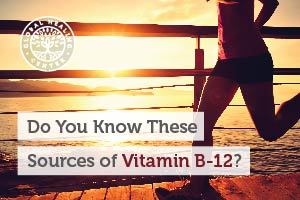
You might not know it, but you owe your life to bacteria. That’s because they are the only creatures on the planet that create vitamin B12, a vitamin you cannot live without. If you become deficient in B12, your mental health suffers, your metabolism slows, you feel fatigued, and you can develop heart disease, osteoporosis, and anemia. Suffice to say, it’s important you get enough and of the right type.
5 Sources of Vitamin B12
Curious about the best sources of vitamin B12? Here’s a list of the top 5 sources of B12.
1. Food
Vitamin B12 occurs naturally in meat, dairy, fish, and poultry. According to the USDA, the richest forms of natural B12 come from clams, beef liver, trout, salmon, tuna, milk, yogurt, and cheese.[1] And since your body can only absorb as much B12 as your body produces intrinsic factor (a protein that makes B12 digestion possible), you need to get plenty of these foods if you’re not vegan. There are no plant sources of vitamin B12. So for vegans and vegetarians, deficiency can be an obstacle. But they are not the only ones suffering from B12 deficiency. It’s estimated 40% of the American people are B12 deficient.[2] So for many, it’s time to turn to other sources.
2. B12 Shots
B12 injections have been used in place of dietary B12 to treat extreme B12 deficiency and to deliver B12 in cases where the body no longer makes intrinsic factor, such as with the condition known as pernicious anemia. These shots deliver B12 in the form of cyanocobalamin or hydroxocobalamin. These are medicinal forms of B12. While B12 shots do provide an effective dose of the vitamin, they come with two drawbacks.
One, who wants to get a shot? Also, the shot commonly delivers cyanocobalamin, a form of B12 the liver must break down before it can be used. This process steals methyl groups from the body (read more about methylation here) and forces the body to deal with toxic cyanide molecules. Not such an appealing option anymore, is it?
3. B12 Gels
Another medicinal form of B12 comes in the form of an intranasal gel. You rub this gel on the inside of your nose, absorbing through the membranes in your nose directly into your blood. One study found 90% of veterans treated for B12 deficiency preferred the gel to the shot.[3]
4. B12 Supplements
You can find a wide variety of vitamin B-12 supplements on the market. One of the most common forms is a vitamin B complex. This supplement form usually comes in tablets and includes all eight of the B vitamins. The downside for B12 in this form is again the use of cyanocobalamin. The cyanide molecule may make it more stable for tablet delivery but does introduce an added toxin the liver must deal with. The best B12 supplements will offer a blend of the bioactive, coenzyme forms of vitamin B12 — methylcobalamin and adenosylcobalamin.
5. Sublingual B12
Right now, sublingual B12 has become very popular. With this supplement, you put the tablet, lozenge, or liquid under your tongue and let it dissolve, or for a liquid, hold it in your mouth to allow for absorption. In a matter of seconds, B12 absorbs through the membranes in your mouth and enters directly into your bloodstream.
The type of B12 generally used for sublingual B12 are the two forms your body uses — methylcobalamin and adenosylcobalamin. This means once it’s absorbed, your body can put it to immediate work. Plus, methylcobalamin is a methyl donor, so your body gets an additional methyl group in addition to the B12 you need.
A Final Thought
When it comes to B12, you don’t really have a lot of options. Get it through your diet, or go for a supplemental form. A liquid B12 supplement has several advantages. It doesn’t hurt like a shot does, it delivers the B12 forms your body can immediately use, it’s as effective as a tablet or pill, and it's easier to digest. This means if you’re older and don’t produce as much intrinsic factor, or have reduced intrinsic factor due to illness, you’ll probably get more B12 than you would if you took a pill or tablet.
If a liquid B12 supplement is what you’re after, then check out our Vitamin B12. GMO and gluten-free and 100% vegan and kosher, our B12 is appropriate for just about everyone. It contains methylcobalamin, adenosylcobalamin, and hydroxocobalamin for maximum bioavailability and a pleasant taste for maximum enjoyability.
References (3)
- National Institutes of Health. Vitamin B12: Health Risks from Excessive Vitamin B12. NIH.
- Judy McBride. B12 Deficiency May Be More Widespread Than Thought. United States Department of Agriculture.
- Suzuki DM1, Alagiakrishnan K, Masaki KH, Okada A, Carethers M. Patient acceptance of intranasal cobalamin gel for vitamin B12 replacement therapy. Hawaii Med J. 2006 Nov;65(11):311-4.
†Results may vary. Information and statements made are for education purposes and are not intended to replace the advice of your doctor. If you have a severe medical condition or health concern, see your physician.







